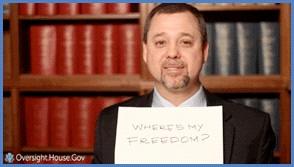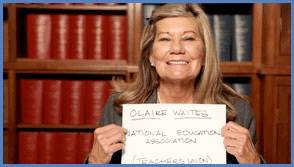Faces of Forced Union Political Contributions
American Workers Denied The Right to Choose
WASHINGTON, DC – American workers are being forced by union leaders to give money to partisan political activity they oppose. On February 8th, three of these workers testified before the House Committee on Oversight and Government Reform about how forced political contributions violate their freedom and rights. But Terry Bowman, Claire Waites and Sally Coomer are not alone: many workers are not even informed of their right to control their own hard-earned money, facing threats and intimidation when they are brave enough to speak out against this unfair loss of workplace freedom and fairness. These are the faces of forced contributions to the union special interest agenda.
Sally Coomer, Service Employees International Union (SEIU) Member from Duvall, Wash.

CLICK HERE to watch Sally Coomer’s story
“We were required at the end of 2009 to quit our agency employment and transfer over to a system that is unionized by the SEIU, called the Individual Provider System. Caring for my daughter is not a job that requires union intervention…The thing that is very discouraging for me is every month, you know, I’m seeing close to $95 a month being taken out of the check for union dues, going to causes I do not support. For me, that $95 a month would provide an additional 9 to 10 hours of care for Becky directly…. I feel very strongly that any type of union that a person belongs to that if the union is going to take out union dues that that employee should be well-aware of what those dues are being spent for. And that, if they are using it for political purposes that they should be aware of that and they should be able to make a choice as to whether or not that that is what they want their union dues to be spent on.”
Terry Bowman, United Auto Workers (UAW) Member from Ypsilanti, Mich.

CLICK HERE to watch Terry Bowman’s story
“You know, the United States government has given labor unions the ability to trump an individual’s First Amendment right and force the seizure of an individual’s personal property – their wages – for simply exercising their pursuit of happiness by applying for a job. I really would like my first amendment right of freedom of association back. I do not have the ability to exercise that right in a forced union state. Unfortunately the union dues that I am forced to pay, much of that goes to political reasons that I disagree with. To the people who are actually pulling my dues out, you do not have to right to use my money as you so choose to use it. The fact that my plant chairman, at a union meeting, will stand up there and point to all of us and say you all better be voting for democrats is not what a union was created to do and is not what it was meant to do. So unions have lost their way. They realized that compulsion was not the way to go, but when they smelled the potential hundreds of millions of dollars from forced unionism, they had to go that route. I think it’s quite unfortunate.”
Claire Waites, National Education Association (NEA) Member from Daphne, Ala.

CLICK HERE to watch Claire’s story
“I am in the Baldwin County Teacher’s Association, the Alabama Education Association, and the National Education Association because there are no other carriers for liability insurance for teachers in the state of Alabama. The NEA Fund for Children, you’d think it’s a fund for children and it’ll go to actually classroom expenses or classroom projects or teacher grants or actually go to underprivileged children. In reality, the NEA Fund for Children goes to political action groups that they choose. We have no voice. They choose who they would like the money to go to… Right now in the economy, classroom teachers need money. This is the third year that I’ve bought my own classroom supplies. For the $180 that I gave to the Children’s Fund, that’s three classroom labs in my room. My message to NEA is that if you’re going to have a children’s fund have a children’s fund. If you’re going to have a PAC fund, have a PAC fund. Don’t trick me to give to your PAC fund by making it named a children’s fund.”
On February 8th, the Committee published a report finding that the Obama Administration and recent court cases have directly contributed to the loss of workplace freedom as well as worker rights violations endured by Ms. Coomer, Mr. Bowman and Ms. Waites. As the federal government aids and abets these violations, union leaders spent more than $1.1 billion on partisan politics during the 2010 election cycle. The Committee will continue to investigate the growing lack of accountability and transparency in how union leaders take dues money from rank-and-file members and spend that money on political causes many of their own members oppose.
REPORT: “Workplace Freedom and Fairness: Are Workers Forced to Fund Political Causes They Oppose?”
COMPLETE HEARING VIDEO: http://bit.ly/w9I1P3
YOUTUBE PLAYLIST: http://bit.ly/xvkQQR
SUGGESTED TWITTER HASHTAGS: #WorkerFreedom #Union #Labor
American Workers Speaking Out Against Forced Political Contributions
Sally Coomer, Duvall, Wash.: Sally is a homecare worker and mother of a disabledadult daughter for whom she is also the primary caregiver. She receives Medicaid funding to provide full-time care for her daughter, but by operation of current law, she has been forced to become a member of the Service Employees International Union (SEIU). According to Sally, new laws pushed by the union have created a twisted and complicated relationship between the state, Sally and her daughter. The law states that an independent caregiver is an employee of the client for whom he or she cares, and the state is considered the employer for collective bargaining purposes only. Sally is technically an employee of her mentally incapacitated 21-year-old daughter. This employee definition also affects Sally’s ability to secure financial stability for retirement. In her previous non-union capacity, she wasable to pay into the Social Security system. This is not allowed as aunionized employee, a fact Sally calls an “unintended consequence” of the law.
Terry Bowman, Ypsilanti, Mich.: An assembly line worker at a Ford Motor Company plant in Rawsonville, Terry has been a United Auto Workers (UAW) member for 14 years. But he and others have experienced criticism for exercising their right to speak on issues of policy and politics different from those expressed by union leadership. If an individual does speak out, Terry says, “he or she is going to be harassed and persecuted on the job for doing so.” According to Terry, these workers are often treated as “less” than others and “left out of the big picture in the workplace,” for speaking their minds.
Claire Waits, Daphne, Ala.: Claire is a career educator and joined the local teachers union to obtain professional liability insurance, the only affordable source for such coverage. Despite Alabama’s “right to work” status, Claire is forced to remain a union member in order to secure this essentialcoverage. Claire also reports that her union has pressured workers tocontribute a portion of conference per-diem expenses to a “children’s fund” that was described as a benefit for children but was in fact used primarily for political activity and supporting candidates favored by union leaders.
###